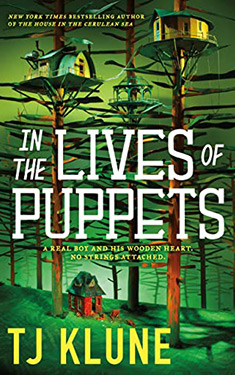TJ Klune
Completed 6/17/2023, Reviewed 6/19/2023
5 stars
Another incredible book by TJ Klune. I adored it. It’s a sweet story about a chosen family, inspired primarily by the original story of Pinnochio (as opposed to the Disney-fied version), as well The Swiss Family Robinson and the Wizard of Oz. I even found a little Frankenstein in there as well. It features an asexual young man, shedding light on what it feels like to be ace, and what it means for an ace person to be in love. It’s also a story about robots in the future that have exterminated most of the humans. It’s a scary look at what could come of AI. I just love Klune’s books. There is always a warmth, a humanness to them that is often lacking in other science fiction and fantasy, even though this is primarily about robots. This book is no exception. It’s a worthy successor to The House in the Cerulean Sea and Under the Whispering Door.
The plot is pretty straightforward. Gio Lawson is a creator robot. He invents and repairs many items, whether it’s other robots or non-robotic mechanical devices. He lives in the forest with his human son, Victor, who also becomes a creator and repairs things. In their little family, there are also two robots, an old Roomba-like robot named Rambo, and a sweetly sadistic medical device named Nurse Ratched (yes, as in Cuckoo’s Nest). Life is fine until Victor finds a scrapped android in the nearby scrap yard. He restores the android, giving it a mechanical heart tainted with his blood, like Gio has. HAP (for Hysterically Angry Puppet) comes back to life, but has no memory of its former life. Soon, Victor finds out that HAP and Gio have a shared past, that of hunting and killing humans. As he’s coming to grips with that, the robot Authority finds Gio, captures him, and takes him back to the City of Electric Dreams. Victor decides he must find Gio at all costs to restore his family, travelling with HAP, Rambo, and Nurse Ratched to the City in search of the Blue Fairy, the only robot that might be able to help him.
Victor is a wonderfully developed character. He doesn’t speak until he’s five or six, and his only role model is his robot father. Despite being a robot, Gio is very human. He found himself becoming lonely, aching for the love of another. So with the help of the Blue Fairy, he escaped the City and genetically engineered Victor. With the help of Rambo and Nurse Ratched, the four of them become a little family. Then when HAP comes onto the scene, Victor experiences the first inklings of love. It’s all very sweet, but also very complicated.
Rambo and Nurse Ratched are great for comic relief. Rambo can’t stop talking and Nurse Ratched wants to constantly perform autopsies on things to study them better. But they are also part of this weird and wonderful little family of Victor’s. They would do anything for him as he would do anything for them.
HAP is an amazing character. At once terrifying and lovable, he is more of a Frankenstein’s monster than Pinnochio. Despite having a violent nature, he’s imprinted on Victor and would go to any lengths to protect him. But he’s still basically a puppet, whom Victor clearly wishes were a real boy.
I loved the ending. It could have been completely schmaltzy. Instead, it carefully stepped around the easy saccharine tropes and became a slow, deliberate, yet hopeful ending. Everything doesn’t turn out perfectly for Victor and his family, but it’s a start. And it’s enough of a start to make your eyes leak.
This is another five stars from me for Klune. I really tried to guard against being too easy on the book and the author. I did happen to see him at Powell’s Books a few weeks ago and found him a delightful speaker. He was also very gracious during the signing, even though I was towards the end of the massive line and he was clearly getting tired. No, I’m giving this book five stars because I love Klune’s prose. It’s not pretentious, but gently descriptive. And I felt here that Klune wrote action remarkably well. And of course, I had a few tears at the end. But most of all, Klune really knows how to write queer, genre-defying tales that make you think hard and feel deeply.

No comments:
Post a Comment